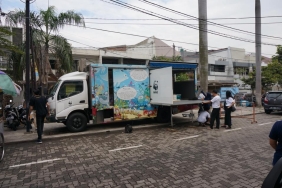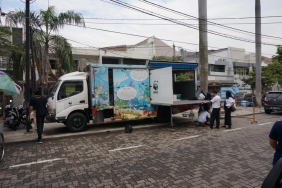BETWEEN US, PLASTIC AND THE ENVIRONMENT
By: Nur Arinta (WWF-Indonesia Mobile Panda Volunteer)
As one of Panda Mobile's volunteers, I often accompany the children of the schools we visit when doing 3R (Reuse, Reduce, Recycle) activities. One of the activities is to turn used t-shirts into multipurpose bags that can replace plastic bags when shopping. Thus, the use of plastic bags can be further reduced.
Unconsciously, humans have indeed depended on the use of plastic. The use of plastic, which tends to increase and can be said to be excessive, can ultimately have a negative impact on the environment. It is estimated that there are 500 million to 1 billion plastic bags used by the world population within 1 year. This means there are about 1 million plastic bags per minute. Meanwhile, it takes ± 12 million barrels of oil per year to make them and 14 million trees are cut down.
Excessive consumption of plastic also results in a large amount of plastic waste because it is not derived from biological compounds. Plastics are non-biodegradable. Plastic is estimated to take 100 - 500 years to decompose completely. Plastic bag waste can pollute soil, water, sea, and even air.
To deal with plastic waste, some parties try to burn it. But the incomplete combustion process does not break down the plastic particles perfectly so that it will become dioxin in the air. That is why humans will be susceptible to various diseases including cancer, nervous system disorders, hepatitis, liver swelling, and depressive symptoms. In addition, burned plastic does not completely disappear but rather melts and changes shape. The deformed plastic remains and settles in the soil. Eventually the plastic will reduce the quality of the soil it has polluted.
It is impossible to eliminate the use of plastic bags 100%, but the most possible is to reuse plastic (reuse), reduce the use of plastic (reduce), and recycle plastic waste (recycle). Lastly, regulations may be needed from the authorities (government) to curb the rate of plastic usage.
Sometimes we feel that it is very hard and difficult to do the 3Rs. However, there are easy things that we can do to contribute to the effort to reduce plastic waste production. The ways are as follows:
Refuse plastic bags if not needed. According to a survey, plastic bags account for the largest amount of plastic waste. If you buy something in small quantities at a stall or mini market, carry it by hand or put it in a bag. Always keep a foldable cloth bag handy so that it is flexible to carry around. These cloth bags can be an alternative to plastic bags and can be used repeatedly.
- Bring your own water bottle wherever you go. In fact, water bottle waste is one of the dominant plastic waste.
- Carry your lunchbox with you wherever you go. So many foods use plastic as packaging. If you buy a food and take it home, the seller will give you plastic as the packaging of the food. It would be better if you can take it home with your own lunchbox.
- Be creative with plastic waste. Change the mindset that waste is worthless, because there are actually many things you can create from waste.
- Be creative with plastic waste.
- Always be responsible for the waste you produce. The phrase "throw your trash in the trash can" is something we've all come across. But now change the concept with the principle to reduce waste production, especially plastic waste.
Do the above with determination and consistency. That way you have become part of saving the earth.





